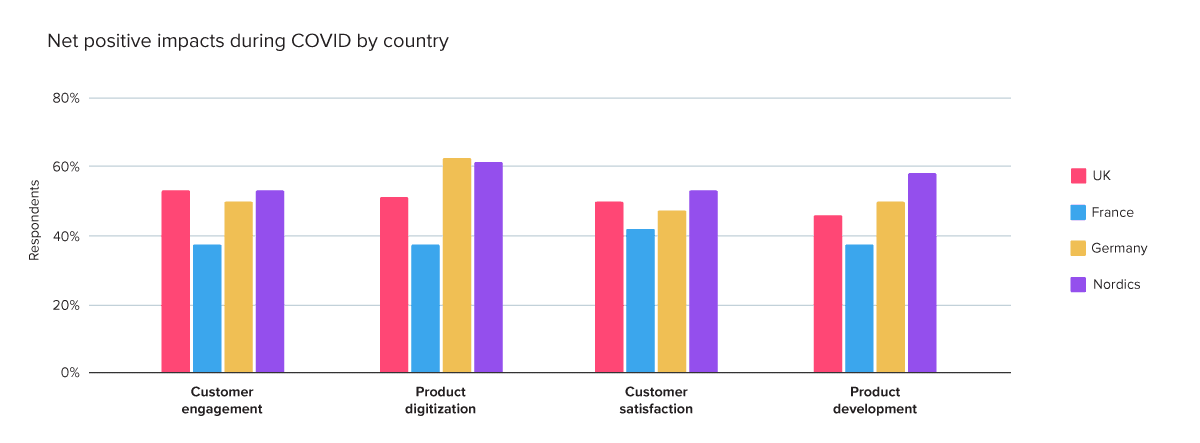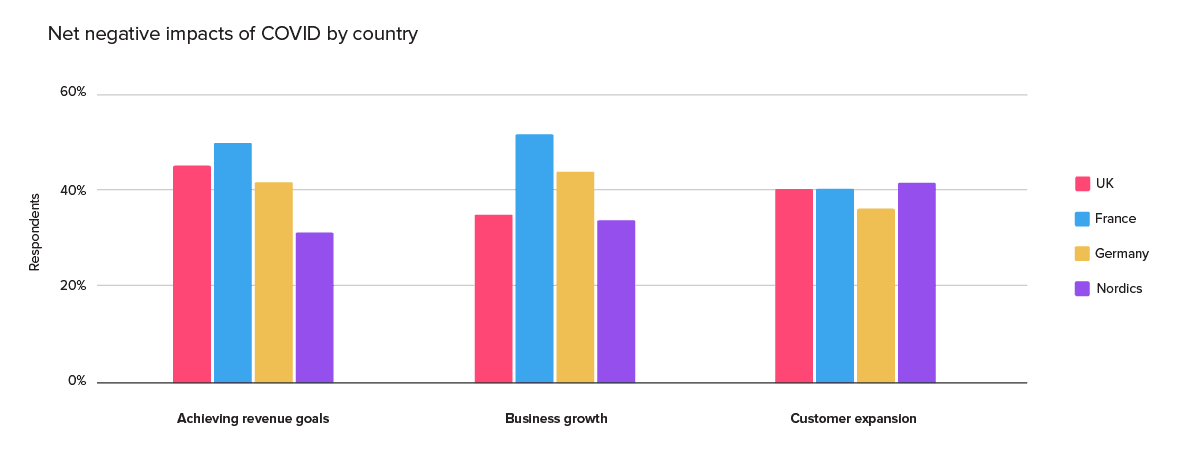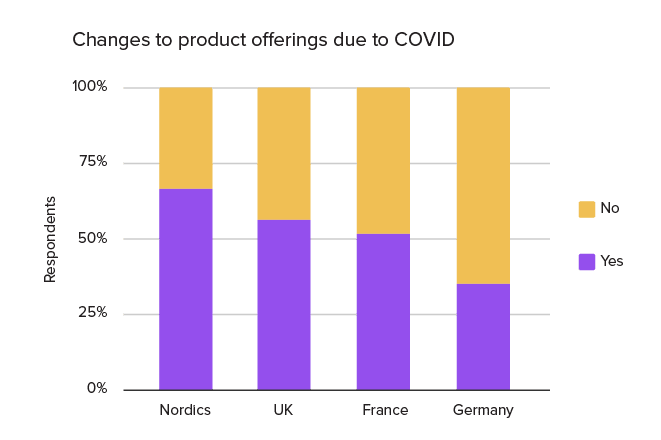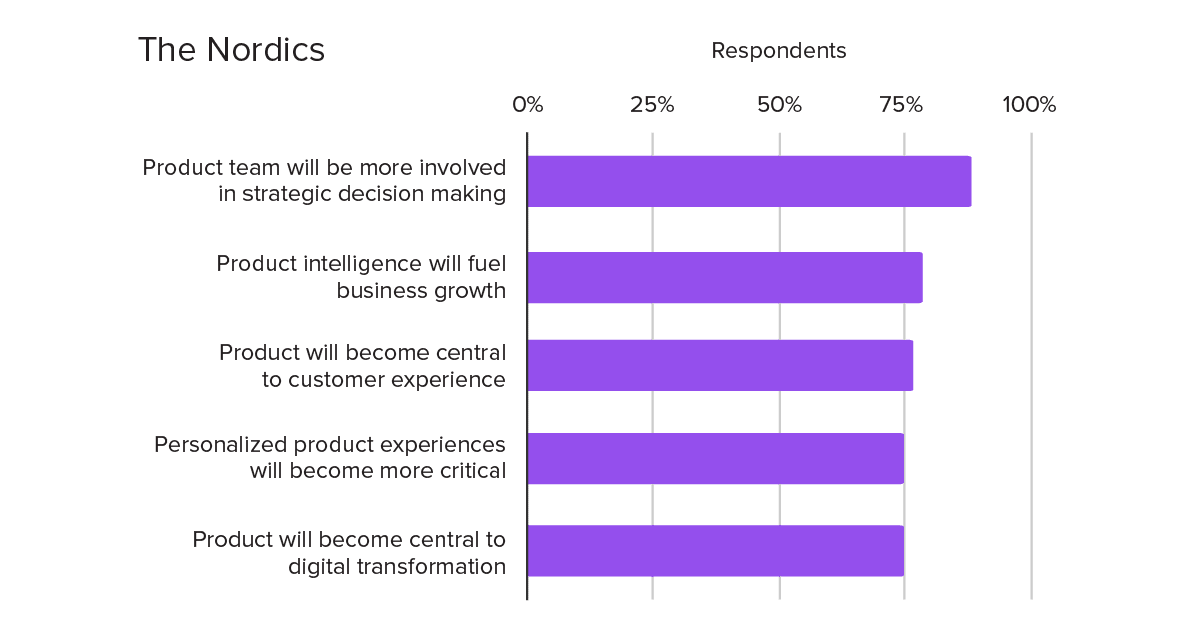COVID-19 forced product teams across the globe to adapt to a new way of working, whether teams were ready for it or not. Across marketing, sales, and even product, the pandemic laid bare the vulnerabilities of company KPIs focused more on the transaction, and less on the customer. In fact, our own research shows that about 32% of product leaders in Europe reported a decline in growth against pre-pandemic projections.
As a consequence of this sudden shift, the role of the product manager is evolving. Product teams across Europe are finding themselves not only being asked to provide input on what KPIs the company should focus on, but to also lead the charge on their businesses’ adoption of technology and services to replace outdated, manual processes and programs.
Product teams across the continent have had to adapt to the “new normal,” but while businesses in the UK, France, and Germany have found the shift to a product-led mindset challenging, it appears almost like business as usual for teams based in the Nordic region.
How Nordic PMs view COVID’s impact on the business
Through our survey of 250 product professionals across the UK, France, Germany, and the Nordics, we were able to better understand their perceptions of COVID and its impact on their teams. Product leaders in all four countries felt the pandemic positively impacted certain areas, namely customer engagement, product digitization, customer satisfaction, and product development. Product pros in the Nordics, though, appeared slightly more buoyant about these key focus areas.

When assessing the net negatives on the business–mainly in the areas of achieving revenue, business growth, and customer expansion–on average, the Nordic region was less aligned in consensus. This hints at the fact that despite the pandemic, every team didn’t necessarily feel strongly that it was negatively impacting their business.

The reason for Nordic PMs’ more favorable outlook? We have a theory: Unlike their southern counterparts, the Nordic region was already on its way to implementing product-led business strategies and leading their organizations through digital transformation. As a result, Nordic product teams were able to adapt more quickly to the shifts demanded of SaaS businesses. We saw this play out most prevalently in the percentage of Nordic teams that changed their product offerings due to COVID (65%) compared to their counterparts.

As a result of this willingness to adapt, product teams in the Nordic region have potentially cushioned themselves against the severity of COVID’s impact on their businesses, earning them not just praise from leadership, but a seat at the decision-making table–and they appear up to the task.
Balancing hard data with gut instinct
The best product leaders know that data should determine where to go next. Product teams have always counted on hard numbers to guide their decisions, and COVID has only strengthened that assumption. But based on our survey in the Nordic region, we hypothesize that Nordic teams rely on their data, but also use data as an input for generating creative ideas to bring about lasting solutions, allowing them to weather the COVID-19 storm a bit more smoothly. In essence: it is a combination of data and the human element of decision-making that has given teams in Finland, Denmark, Norway, and Sweden a leg up.
Nordic product teams’ role in digital transformation
Like their European counterparts, Nordic PMs feel strongly about the change in the product team’s role, with over 88% of them believing that product teams will be more involved in strategic decision making in the future. More importantly, 75% of product leaders in the Nordics see product becoming central to digital transformation, and that product intelligence is critical as they look to drive growth in this new normal.

COVID-19 has fundamentally changed how European product managers perceive not only their role in the business, but also what they need to measure in order to ensure they make it through this crisis. From a business standpoint, the Nordic region has weathered through the pandemic relatively better than other countries, and with that, a sense of optimism, innovation, and excitement for the future has fueled their drive for change.
While it’s clear that not every team can (or should) function like product teams across Norway, Sweden, Finland, and Denmark, we can still be mindful of the following learnings:
-
- Continue using data to make product decisions, but also leverage data to help fuel the customer experience through product intelligence.
- It’s inevitable that businesses will look to product teams to help make strategic decisions moving forward–don’t run from the challenge.
- When it comes to choosing the right metrics to focus on, always put the customer first.
- Continue using data to make product decisions, but also leverage data to help fuel the customer experience through product intelligence.


